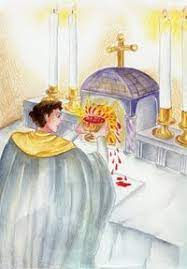The Guardian Angel: Eucharistic Miracle, Patierno (Naples) Italy, 1772
- Donald Hartley

- Aug 16, 2021
- 4 min read

May this Eucharistic Miracle bless you, and help you to bring our Lord to others who have scales on their eyes. To Jesus through Mary, GregoryMary
On August 29, 1774, the Curia of the Archbishop expressed itself favorably regarding the miraculous finding and unexplainable preservation of the Hosts stolen from the Church of St. Peter’s in Patierno on February 24, 1772.
In 1771 the Eucharistic Year of the diocese had been established in order to allow the community to capture the essence of the Eucharistic miracle. Unfortunately in 1778 some unknown thieves were able to steal the relic with the miraculous Hosts of 1772.
In 1772, unknown thieves stole a certain number of consecrated Hosts that were found a month later in the lands of Duke Delle Grottolelle underneath manure. However the Sacred Hosts were completely intact.
The appearance of mysterious lights and a dove made it possible to see where the Hosts were buried. Saint Alphonsus Liguori described this miracle in detail and took the opportunity to reawake the faith and devotion of the people towards the Eucharist.

The Vicar General, Monsignor Onorati drew up the minutes of the diocesan trial which lasted two years from 1772 to 1774. In the minutes it was stated that the appearance of the lights and the intact preservation of the consecrated Hosts “has been and is an authentic miracle operated by God to illustrate more and more the truth of the Catholic dogma and increase the worship towards the Real Presence of Christ in the Holy Sacrament of the Eucharist.”
Among the various testimonies there were also those of three renowned scientists of the time among which was Dr. Domenico Cotugno of the Royal University of Naples and they all agreed in saying that “The intact preservation of the Hosts cannot be explained with physical principles and they surpass the power of natural agents. Therefore, they must be considered as miraculous.”
In 1972 Professor Pietro De Franciscis, teacher of human physiology at the University of Naples confirmed the above statement. In 1967, Cardinal Corrado Ursi, on the occasion of the elevation of the Church of St. Peter to a diocesan Eucharistic Sanctuary said “The prodigious event of St. Peter is a gift and a divine warning for the whole archdiocese. Its voice must never weaken but must urge the faithful of all times to consider the message regarding the ‘Bread of Life for the salvation of the world’ launched by Christ at Cafarnas.”

ST. IGNATIUS OF ANTIOCH (Alt)
St. Ignatius became the third bishop of Antioch, succeeding St. Evodius, who was the immediate successor of St. Peter. He heard St. John preach when he was a boy and knew St. Polycarp, Bishop of Smyrna. Seven of his letters written to various Christian communities have been preserved. Eventually, he received the martyr's crown as he was thrown to wild beasts in the arena.
"Consider how contrary to the mind of God are the heterodox in regard to the grace of God which has come to us. They have no regard for charity, none for the widow, the orphan, the oppressed, none for the man in prison, the hungry or the thirsty. They abstain from the Eucharist and from prayer, because they do not admit that the Eucharist is the flesh of our Savior Jesus Christ, the flesh which suffered for our sins and which the Father, in His graciousness, raised from the dead."
"Letter to the Smyrnaeans", paragraph 6. circa 80-110 A.D.
"Come together in common, one and all without exception in charity, in one faith and in one Jesus Christ, who is of the race of David according to the flesh, the son of man, and the Son of God, so that with undivided mind you may obey the bishop and the priests, and break one Bread which is the medicine of immortality and the antidote against death, enabling us to live forever in Jesus Christ."

-"Letter to the Ephesians", paragraph 20, c. 80-110 A.D.
"I have no taste for the food that perishes nor for the pleasures of this life. I want the Bread of God which is the Flesh of Christ, who was the seed of David; and for drink I desire His Blood which is love that cannot be destroyed."
-"Letter to the Romans", paragraph 7, circa 80-110 A.D.
"Take care, then who belong to God and to Jesus Christ - they are with the bishop. And those who repent and come to the unity of the Church - they too shall be of God, and will be living according to Jesus Christ. Do not err, my brethren: if anyone follow a schismatic, he will not inherit the Kingdom of God. If any man walk about with strange doctrine, he cannot lie down with the passion. Take care, then, to use one Eucharist, so that whatever you do, you do according to God: for there is one Flesh of our Lord Jesus Christ, and one cup in the union of His Blood; one altar, as there is one bishop with the presbytery and my fellow servants, the deacons."
-Epistle to the Philadelphians, 3:2-4:1, 110 A.D.





















Comments